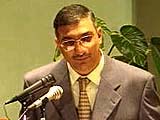We were officially informed today that we are not allowed to cover the situation in Al-Arish. Any regular reader of the Egyptian Press will not know what I am talking about but it is common knowledge that things have not been good in Northern Sinai for a long time. And it is not Egypt and Israel at loggerheads nor Egypt and Hamas.
A cousin of mine lives in Al-Arish and has told me that indigenous inhabitants of the area are quite detached from the rest of Egypt- not only because of the distance between Cairo and North Sinai but also culturally and linguistically. In addition to which the people have been badly neglected by the government, leaving a deep seated hatred of the establishment and sometimes even a greater affiliation to Israel.
The Bedouin complain of economic marginalisation, police harassment and limited access to jobs in the lucrative tourism and petroleum sectors in Sinai, which produces a significant share of Egypt's oil from offshore fields and is dotted with resorts popular with tourists seeking sun, sand and diving. Jobs at the few privately owned factories in the region and senior posts in state institutions are usually reserved for workers from the Nile Valley, as part of a policy to increase the population of Sinai and integrate it with the rest of the country.
In a huge number of cases, these Egyptians are barred from access to education, healthcare and basic public services. It is not surprise that hatred has been sown and it is from this background that a group of bombers emerged, killing more than 100 people between 2004 and 2006 in a series of three bombings at Sinai resorts frequented by foreigners.
Having covered the official state organised press campaigns promoting the national 1994-2017 plan for Sinai, I know that the government would protest its innocence and insist that all Egyptians are equal- however this is very far from the reality.
The most recent train of events took place recently and actually started with a family feud between two clans from Al Arish, however the situation was mishandeled by the police and it spiralled into a blood feud which quickly drew in most inhabitants of the city.
On the 3rd of January, Egyptian police clashed with thousands of demonstrators who attacked government buildings in North Sinai to protest the murder of a man by armed robbers. Police fired tear gas on the swelling crowds, which one security official estimated at 7,000 people, after they stoned local government offices in the coastal town of El-Arish. The demonstrators had gathered earlier to protest what they said was lawlessness in North Sinai after a 50-year-old man was shot dead by thieves who tried to commandeer a truck filled with food.
This is just another demonstration of the lawlessness that has been bred by extreme frustration at the injustices taking place on a daily basis.



